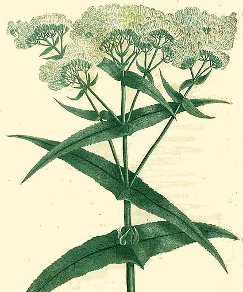 Eupatorium perfoliatum
Eupatorium perfoliatumBoneset
Many practitioners of different paths consider boneset good for protection and exorcism: they gather the herb and tie bundles over doorways to repel ghosts and get rid of spirits that might have become attached to people who have had contact with the dead, they add it to an Uncrossing Bath or Wash, they carry it in a mojo bag along with angelica root and devil's shoestrings. In contrast, Chippewa hunters made a charm to attract deer from the root fibers of this herb--in other words, they used it to bring near instead of repel. The Iroquois had another take on this herb; it healed negative physical effects caused by the presence of menstruating girls (darn those pesky powerful girls!), to poison someone by putting it in their liquor flask, or to cure someone of drinking (we can think of this as driving out the demon of drink), but of particular interest for us, boneset was for them an aide in divination and sorcery. Called "boneset" because it was used to treat breakbone (dengue) fever in the South and the bone ache of the flu in many locales, this magic herb is typically considered to be ruled by Saturn, who is in charge of bones. That might be because of its name and the way it heals what feels like broken bones (and some people actually have used it as a poultice for broken bones or physical bone pain). This is an interesting occurrence of a Saturn influence for protection. Think of this as the Saturn energy that helps enforce boundaries and borders. Top
Medicinal Uses
This herb was a common treatment for any number of complaints in the late 19th century in the American countryside; check out the old-time recipe for a tea to throw off a cold. In West Virginia folk medicine, boneset was simmered with lemon and honey to make a cough syrup. The Eclectic physicians used it with success during the influenza epidemic of 1918-19. In modern herbalism, it is usually combined with elder and willow for fevers with aches, and with scullcap and milkweed for flu. In large amounts, boneset is an emetic and a purgative; wortcunning folk would harvest this herb by pulling up on the leaves for use as an emetic and down on the leaves for use as a purgative. Because it's a bitter, people have used it against malaria (parasites don't like bitters). Also known as common thoroughwort, Indian sage, ague weed, crosswort, wild sage, thorough wax, vegetable antimony, sweating weed, wild Isaac. Boneset is also a common name for comfrey in Europe, but that's a completely different plant, and boneset does NOT contain the toxic pyrrolizidine of comfrey. Top
How to Grow Boneset
This seed can germinate without cold stratification. It needs light to germinate, so sprinkle on wet planting medium and then firm in with gentle finger pressure. They will germinate faster and better after cold stratification. You can just plant them in the fall in a protected location (a flower pot with a screen over the top to keep out mice). This perennial gets 3-4ft/90-120cm high and 18-24in/45-60cm wide. It's perennial throughout much of North America, from zone 3 (-40F/-40C) to zone 9 (25F/-3C). It likes full sun and damp, rich soil. Flowers appear in the late summer and fall of the second year of growth. The fragrant off-white flowers attract all kinds of pollinators--bumblebees, butterflies, small bees, and flower wasps. Sparrows like the seeds. Some people find the hairs on the stem to be irritating. It will creep around underground by rhizome growth and form small colonies. It also reproduces by wind-blown seeds, but it very much prefers wet ground, so it doesn't usually go crazy in a lawn. Grazing animals usually won't eat it because it is bitter. This herb needs to be dried quickly once it is picked or it will rot. Top
Botanical Tea (1940)
2 oz. boneset
1 oz.
juniper berries
2 oz. elder berries
1 oz. wild ginger root
2
oz. calamus root
Add to 2 quarts water and simmer until water
is reduced to 1 quart. Then 1 cup was drunk before retiring to sweat
out a cold.Top
Uncrossing
Bath
Boneset
Elder
Basil
Bay
Leaves
Infuse and pour into ritual bath water. Use
for 3-9 days in a row. Top
Eupatorium perfoliatum
Boneset
100 seeds $3.75
Uses in Witchcraft & Magic:
Protection
Exorcism
Hunting
Magic
Divination
Sorcery
Saturn Herb
© 2012-2024 Alchemy Works; No reproduction without permission